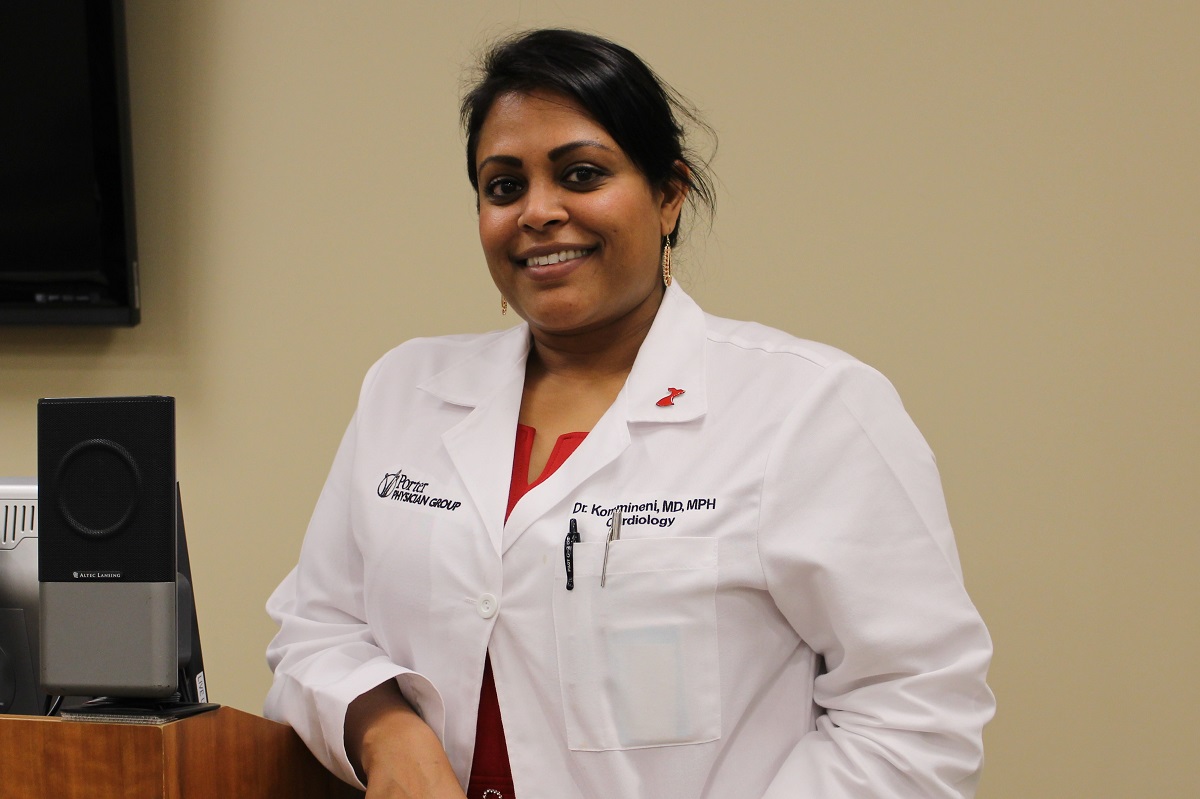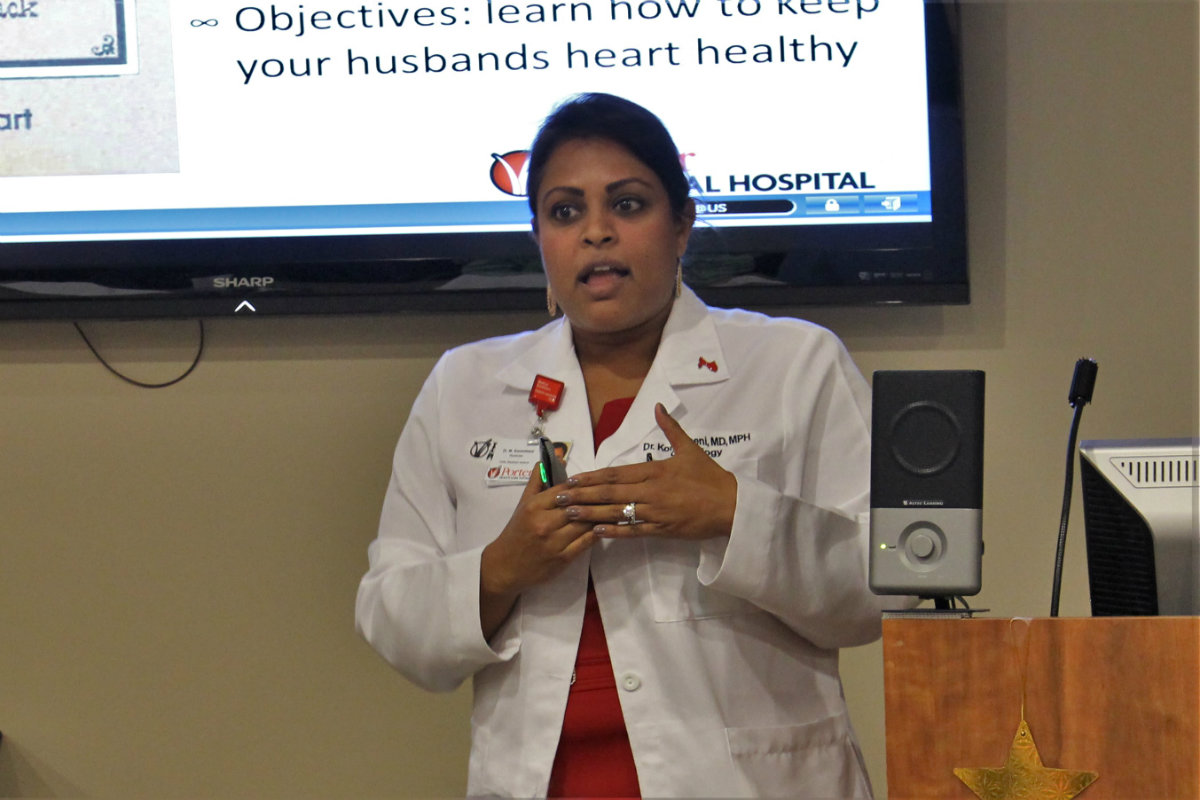 Keeping with the heart health theme during American Heart Month, Porter Health Care System held another interesting and informative event that targeted the ladies called “The Heart of a Woman”.
Keeping with the heart health theme during American Heart Month, Porter Health Care System held another interesting and informative event that targeted the ladies called “The Heart of a Woman”.
The evenings presenter was Maya Kommineni, M.D., MPH. Dr. Kommineni is new to Porter Health Care System, but not the medical field. She is a Cardiologist who uses a multidisciplinary approach to heart disease management which includes the treatment of heart failure, valvular heart disease, hypertension, lipid disorders, abnormal heart rhythms, peripheral vascular disease, and coronary artery disease. Dr. Kommineni takes a special interest in preventative cardiology, women’s heart health, and cardiovascular nutrition, which were the topics of that night’s presentation.
“What’s important but not yet known or popular is evidence-based nutrition,” Dr. Kommineni said. “Prevention is so important and the idea is to stop heart disease before it starts or lessen the effect. I want to share my knowledge with people and tell them about what I do every day.”
Dr. Kommineni dispelled four myths concerning cardiovascular disease.
1. Cardiovascular disease is a male disease
 It’s quite the opposite, in fact. Cardiovascular disease is a threat to everyone, but women are at greater risk. One in three women will die of heart disease and every year there are over 500,000 cardiovascular diseases diagnosed each year. Heart disease-related deaths even outnumber cancer-related deaths each year.
It’s quite the opposite, in fact. Cardiovascular disease is a threat to everyone, but women are at greater risk. One in three women will die of heart disease and every year there are over 500,000 cardiovascular diseases diagnosed each year. Heart disease-related deaths even outnumber cancer-related deaths each year.
“There is all of this information out there from credible sources; the American Heart Association, the CDC, the National Institute of Health, the ACC, everyone is pulling this information together,” Dr. Kommineni said. “Yet, are we really publicly aware that cardiovascular disease is so harmful to us?”
2. Chest pain only happens in men
The typical crushing pain that men feel in their chest when heart issues arise is not a typical symptom that women develop. Women will feel fatigue, shortness of breath, heartburn, indigestion, flu-like discomfort, and these symptoms will last for days.
“You need to have an open ear when thinking about all of the different symptoms that you need to check when it comes to heart disease,” Dr. Kommineni said. “You’ll get these spattering of symptoms leading up to a heart attack.”
3. No need to worry before Menopause… Right?
Wrong. A traditional way of thinking was that everything with a woman was fine until they got Menopause, and then their risk of heart problems was equal to men. The new way of thinking is as a woman’s hormones fluctuate as she gets older, her risk for cardiovascular disease grows at a steady rate.
Pregnancy is also a factor that comes into play with cardiovascular disease. Hormones change, fluids change; pregnancy is quite taxing on a woman’s body. Some diseases that start during pregnancy like gestational diabetes or hypertension can stick around afterward for the rest of a woman’s life, aiding in the rise of heart disease risk.
Studies show that after having a heart attack, women do not fare as well as men. The mortality rates start out much higher for women when they are younger than for men, but as they get older, the mortality rates of both sexes evens out.
“Women have a higher mortality rate than men during our peak childbearing years,” Dr. Kommineni said. “This is when we’re up and about, taking care of our families, getting out into the community, and being active.”
4. Hormone Replacement Therapy
 To quell menopausal symptoms, women will do hormone replacement therapy. Doctors used to even encourage women to do hormone replacement therapy because it was thought to be beneficial to the heart. Dr. Kommineni did a research study on this once and found that though the menopausal symptoms decrease with hormone replacement therapy, the risk for heart disease, breast cancer, stroke, and blood clots increase.
To quell menopausal symptoms, women will do hormone replacement therapy. Doctors used to even encourage women to do hormone replacement therapy because it was thought to be beneficial to the heart. Dr. Kommineni did a research study on this once and found that though the menopausal symptoms decrease with hormone replacement therapy, the risk for heart disease, breast cancer, stroke, and blood clots increase.
“The conclusion that I came to from this study was that hormone replacement therapy should not be used to prevent disease in healthy post-menopausal women,” Dr. Kommineni stated.
Dr. Kommineni then stated that most cardiovascular disease can be prevented. High blood pressure, cholesterol, obesity, diabetes, a sedentary lifestyle, and tobacco usage all increase the risk of cardiovascular disease, but we can change all of these things and reduce our risk. However, there are things that we can’t change: gender, age, ethnicity, and genetics.
“We’re just starting to learn how important of a role genetics plays in cardiovascular disease,” Dr. Kommineni said. “Medications that were once thought to work for everyone won’t work for some because we all metabolize drugs differently. New medications are being developed to address this.”
Dr. Kommineni recommended six easy habits that people can pick up to reduce their risk of cardiovascular disease:
1. Stop smoking
2. Reduce you BMI
3. Clean up your diet
4. Get up and out of a sedentary lifestyle
5. Exercise
6. Reduce the amount of alcohol consumed
Dr. Kommineni then mentioned the Framingham Health Study, a huge undertaking by a group of scientists in Massachusetts in 1948 that studied the risk factors for heart disease. Over 5,000 people were observed as the researchers looked for patterns that related to cardiovascular disease development. This study extended into the following generation in 1971, and it continues (with modifications) to this day. The findings of the study indicate that taking up the six healthy habits above will reduce the risk of heart disease by 92% and cardiovascular death by 66% over a 20-year span.
Dr. Kommineni traveled the world, studying various medical cultures in different countries on different continents. The common threat that she found among all of them was that food was used for medicinal purposes.
“All things have an origin, and medical treatments can be linked back to nature,” Dr. Kommineni said.
She shared her four favorite superfoods: avocado, ginger, turmeric, and flax seed. Each is very beneficial for the heart by lowering cholesterol, being low in sodium and high in good fats as well as other important attributes.
Mix them in to a favorite recipe, have a morning smoothie, sprinkle on oatmeal or cereal, eating a good diet of heart heathy food is an easy and effective way to be good to your heart.
For more information about Dr. Kommineni, visit www.PorterPhysicianGroup.com.
